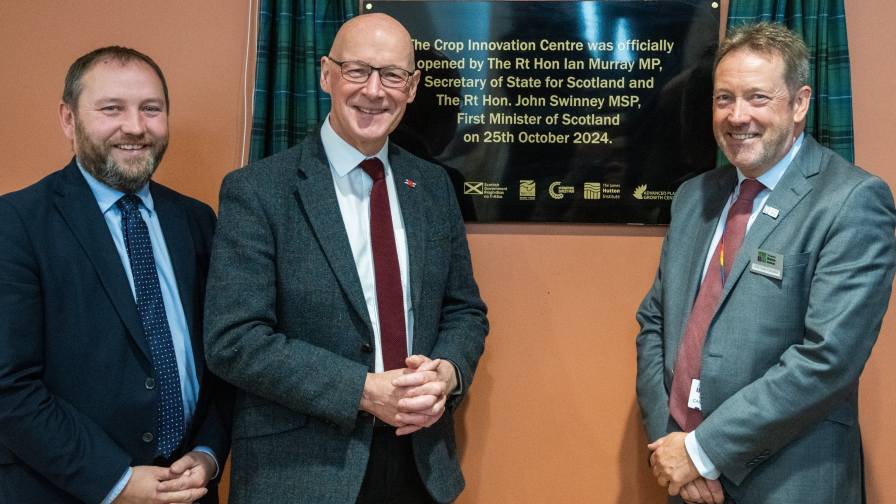World
New Crop Innovation Centre Officially Opens in Scotland

L-R: Secretary of State, Ian Murray MP, First Minister, John Sweeney MSP, and Chief Executive of The James Hutton Institute, Professor Colin Campbell.
The UK Secretary of State for Scotland, Ian Murray MP, and First Minister of Scotland, John Swinney MSP, officially opened the Crop Innovation Centre (CIC) at The James Hutton Institute in Invergowrie today.
The CIC is home to the Advanced Plant Growth Centre (APGC) and the International Barley Hub (IBH), which were created in partnership with the University of Dundee Plants Sciences Division.
Both innovation centres were funded as part of a £62m investment through the Tay Cities Region Deal (TCRD) by the UK and Scottish Governments, which also facilitated the construction of the Mylnefield Farm building and the IBH Field Centre on The James Hutton Institute’s Invergowrie campus.
The investment offers a unique combination of world-leading science and state-of-the-art facilities for field, farm and lab that deliver technological and digital innovation focused on future-proofing crop production, enhancing food and drink security, managing our natural resources sustainably and supporting thriving rural communities in Scotland and across the globe.
Professor Colin Campbell, Chief Executive of The James Hutton Institute, said: “We received funding for the Crop Innovation Centre in 2020, and the project is underpinned by decades of research at The James Hutton Institute along with partners.
“It cements the reputation of Scotland and the UK as global leaders in research and innovation. It was a pleasure to welcome the First Minister and UK Secretary of State to Scotland today to officially name the facility, and we’re grateful for all of the support we have received to make this ambition a reality.”
Barley is the predominant crop grown in Scotland, partly due to its key role in the world-renowned Scottish whisky industry, which accounts for 75% of the country’s food and drinks exports. However, given climate change and other environmental challenges, coupled with increasing demand for the crop; research into genetics and breeding is vitally important to safeguard production and ensure a sustainable future.
The IBH will promote scientific discovery and innovation to tackle these issues by piloting new breeding technologies such as precision phenotyping and crop management using data from sensors and drones.
The APGC seeks to address global food, non-food and pharmaceutical crops. It is made up of five facilities: a molecular phenotyping centre (to study the characteristics of crops at a molecular level, such as their DNA, proteins and taste and aroma molecules); a high throughput phenotyping platform (which allows the collection and analysis of data in large quantities); a vertical growth tower; a post-harvest storage facility; and next-generation controlled environments with the ability to replicate current, and predicted future, global crop production conditions.
It aims to revolutionize crop production systems to produce food locally, 365 days a year, with less environmental impact. It will utilize facilities like indoor vertical farms, which use LED lights to mimic optimized outdoor conditions, accelerating the breeding and growing of climate resilient and low input crops. This technology will enhance the UK’s capabilities to lead a rapidly expanding market, expected to be worth US $62bn by 2025.
UK Secretary of State for Scotland, Ian Murray, MP, said:
“It was a real pleasure to open The James Hutton Institute’s new Crop Innovation Centre alongside the First Minister. Home to the Advanced Plant Growth Centre and the International Barley Hub, the UK Government is investing £45 million in the Centre through the Tay Cities Region Deal.
“These projects at the world-renowned James Hutton Institute demonstrate Scotland’s cutting-edge research and innovation in practice. The International Barley Hub will deliver world leading research for a crop which is vital to our whisky, beer and food sectors. The Advanced Plant Growth Centre will revolutionize crop production to address critical food security issues.
“Both projects will be key to our future food security, and to ensuring a thriving future for rural communities everywhere.”
The 8000 sq mtr building will be powered by a high-performance data “computer farm”, which is one of the largest in the UK, and will also house a phenotyping centre, due to open in Spring 2025.
Over the next 10 years, the Centre is projected to contribute to over 900 collaborative industry projects supporting an additional 2,600 jobs in the UK, of which 1,760 will be in Scotland and 470 in Tayside. It has been estimated that it will contribute over £900m GVA to the UK economy, over half of which will be in Scotland.









